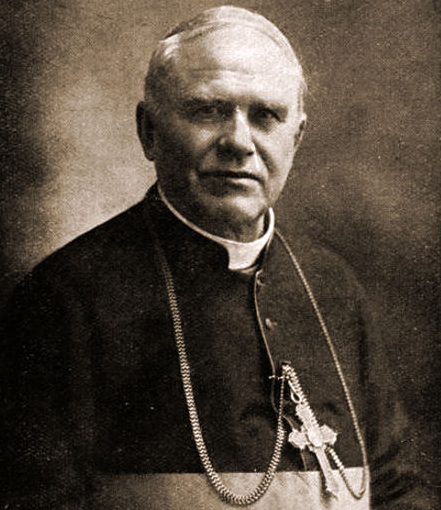Polish protests at persecution of Catholic clergy by Soviet Russia
31 March 1923, Warsaw - Large demonstrations have taken place in Warsaw in protest at severe sentences handed down by the Soviet regime in Moscow to two Polish Catholic clerics - Archbishop Cieplak and his Vicar-General, Fr. Budkiewicz. The two men had been sentenced to death by a Soviet Revolutionary Tribunal, but a message from Moscow to the Polish Press has indicated that the sentence in respect of Archbishop Cicplak, the Roman Catholic Archbishop in Petrograd, has now been reduced to ten years imprisonment.
In an order issued by M. Kalinan, the Soviet has explained the rationale for the amended sentence. ‘Whereas Mgr. Cieplak is the representative of a Faith which was persecuted during the Tsarist regime, and that the capital punishment he deserves, if carried out, might be construed by Catholics in the Soviet Republic as a persecution of their Faith, the more so that their religious prejudices have been exploited by the accused, the death sentence is hereby cancelled.’
On learning of his fate, Archbishop Cieplak is understood to have expressed no emotion and is to have inquired about the fate of his brother - or Vicar-General - Fr. Budkiewicz. Alongside these two prelates, a sentence of 10 years’ solitary confinement was also brought against five priests, with six others facing the lesser sentence of 3 years’ imprisonment.

A bird’s eye view of Moscow in the early 20th century ( Image: Library of Congress Prints and Photographs Division Washington, D.C. 20540)
In a statement condemning the treatment of the Catholic clerics in Russia, the Polish Prime Minister, Władysław. Sikorski declared:
‘The Government and Polish public opinion has followed with close attention and misgiving the policy of the Soviet Government towards the Catholic Church and Ecclesiastical representatives in Russia - a policy which directly interests the Polish minority of 2,000,000 souls scattered throughout Russia.’
The statement accused the Soviet Government of trumping up charges against the Catholic clergymen. Indeed, in its coverage of the Archbishop Cieplak case, the New York Times has concluded that the charges against him stemmed from three basic, unalterable facts: that he was a priest; that he was a Pole and that the Bolsheviki didn’t like him.
Soviet attitudes towards religion in general have recently been outlined in Pravda, the organ of the Communist Party in Russia. Pravda has urged that the agitation against religion be carried out just as systematically and with even more determination than Bolshevik agitation on political issues.
‘It is necessary to work slowly, word by word, drop by drop, to worm our way and convince the stubborn that by the unwritten decrees of the victorious proletariat the inhabitants of Heaven and all their attributes have been abolished.’
[Editor's note: This is an article from Century Ireland, a fortnightly online newspaper, written from the perspective of a journalist 100 years ago, based on news reports of the time.]





















